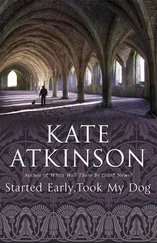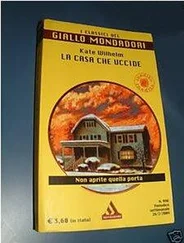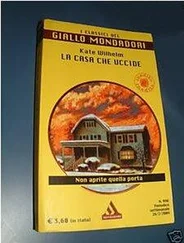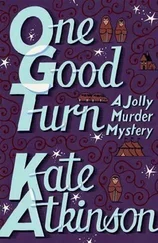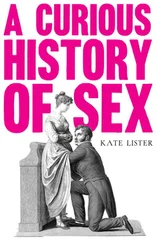"Gas?" he'd said hopefully to the fire investigation officer.
"Dynamite," the fire officer said. (A short, manly kind of ex-change.) Who had access to dynamite? People who worked in mines, obviously. Jackson fished in his wallet for DC Lowther's card and phoned him. "The plot thickens," he said, and wished he hadn't said that because it sounded like something from a bad detective novel. "I think we have a suspect." That didn't sound much better. "My house has just exploded, by the way." At least that was novel.
("Quintus Rain," DC Lowther ruminated, "what kind of a name is that?" "A bloody stupid one," Jackson said.)
He carried the drinks outside, an orange juice for himself, a Coke for Marlee, and a gin and tonic for Kim Jessop, except she was called Kim Strachan now because at some point in the last ten years she had married and then divorced a "mad Scottish head case" called George Strachan. Now she owned a bar in Sitges and a restaurant in Barcelona and was partnered up with a Russian "businessman." She was still blond and sported the deep leathery tan of someone who thought skin cancer happened to other people, although, judging by her smoker's cough, it was going to be a race with lung cancer. As befitted a mafia mistress, she was wearing enough gold to furnish an Indian wedding. She hadn't lost any of the Geordie in her – Kim Strachan, nee Jessop, didn't have a single drop of soft southern DNA in her body. Jackson warmed to her immediately.
"It was lucky you got hold of me," she said, taking a deep drag on a Marlboro. "I'm only in the country for a couple of weeks, seeing Mum, she's bad on her legs these days, I'm trying to persuade her to move out to Spain."
Stan Jessop had reluctantly given Jackson his first wife's mobile number, complaining sullenly that he hardly ever saw his daughter, Nina, because "the bitch" had put her in a Quaker boarding school in York, and Jackson thought to himself that a Quaker boarding school in York sounded pretty accessible compared to a school of any denomination in New Zealand.
Kim Strachan and her family were taking a "farmhouse holiday" somewhere in the vicinity. "A sheep farm," she said. "Bloody noisy things, sheep. The silence of the lambs, my arse." Her "family" seemed to include not only Nina and the mother who was bad on her legs but also " Vladimir " and any number of Vladimir's "associates," one of whom was driving Kim and was currently sipping a Fanta two tables away and scrutinizing every passerby as if he or she might be a potential assassin. "Oh, he's a teddy bear, really." Kim laughed. She'd come a long way since her days in the little thirties semi she had once shared with Stan Jessop.
It turned out that Kim had left Stan the week before Laura Wyre's murder. She had already "taken up" with George Strachan and was behind the bar of a British expatriate pub in Alicante when Laura was killed. Kim had never returned to Cambridge, hadn't even spoken to Stan for two years after she left, "because he was such a bloody wanker," so that when Jackson phoned her and said he was "investigating certain aspects of Laura Wyre's death," she said, "Jesus. Laura Wyre's dead? How?" Jackson felt his heart sink because talking about a girl who was ten years' dead was a very different thing to breaking fresh news of that death. "She's only twenty-eight," Kim said.
Jackson sighed, thinking, No, she was only eighteen, and said, Actually she died ten years ago. I'm afraid she was murdered." There was a silence at the other end of the phone, disturbed only by a surly rumble of Russian in the background. Jackson remembered Emma Drake saying that it was worse hearing about Laura's death when "it was already consigned to history for everyone else." It seemed like the whole world had been out of the country when Laura died.
"Murdered?"
"I'm really, really sorry," Kim said, fishing the slice of lemon out of her gin and putting it in the ashtray.
"Her killer was never found," Jackson said. "Laura might not even have been the intended victim." Jackson cast a doubtful glimpse at Marlee. He probably sounded like he was talking about an episode of Law and Order or CSI rather than real life. He hoped he did, he hoped she didn't actually watch Law and Order and CSI, he hoped she watched Blue Peter and reruns of Little House on the Prairie. He had told Marlee about Laura, that she had been killed by a "bad person" because "sometimes bad things happened to good people," and Marlee frowned and said, "Theo said she was called Jennifer," and Jackson said, "That's his other daughter." How did Jennifer feel, always being the other daughter, the one that got less attention than a dead sister?
"Laura was a nice girl," Kim Strachan said. "She was stuck-up when I first met her, but she was just middle class, you know. You can't hold that against a person, can you? Aye, well, you can, but not Laura. She had a good heart."
"I'm just following up on a few things, people who weren't interviewed at the time," Jackson said. "I'm working for her father."
"Fat bloke?"
"Yeah, fat bloke."
"Theo," Marlee said. "He's nice."
"Yes, he is," Jackson said. He looked at Marlee and said, "Do you want to go and get yourself a packet of crisps, sweetheart?" He reached into his pocket for change but Kim Strachan had already opened her purse and produced a new five-pound note that she gave to Marlee, saying, "Here you go, pet, get what you want. Bloody stupid Brits," she added to Jackson. "Why can't they just get with the euro? Every other bloody country in Europe's managed it."
Kim Strachan lit another cigarette, shaking one out for Jackson, and when he refused she said, "For God's sake, you're gagging for one, man, I can tell."
Jackson took a cigarette. "I was off them for fifteen years," he said.
"What started you again?"
Jackson shrugged. "An anniversary."
"Must have been a big one," Kim Strachan said.
Jackson laughed humorlessly "No, it wasn't. A thirty-third, that's not a significant one, is it? Thirty-three years since my sister died."
"I'm sorry."
"I think it was just one too many. She would have been fifty this year. This week. Tomorrow."
"There you go, then," Kim Strachan said, as if that explained everything. She lit his cigarette with a heavy gold lighter that had something in Cyrillic engraved on it.
"Don't tell me," Jackson said. "From Russia with love."
Kim Strachan laughed and said, "Much filthier than that."
"You wouldn't have any idea who might have wanted to kill Laura, would you?" Jackson asked her. "Any idea, however unlikely."
"Like I said, she was a nice middle-class girl. They don't usually have many enemies."
Jackson produced the photograph of the yellow golfing jumper and held it out to her. She took it from him and studied it carefully. Then her face sort of fell apart. "Jesus Christ," she said.
"You recognize it?" Jackson asked.
Kim downed the rest of her gin and took a long drag on her cigarette before stubbing it out. She had tears in her eyes but her voice was raw with anger. "I should have known," she said. "I should have fucking known it would be him."
I hey drove to Bamburgh and he took Marlee for a long walk on the beach. He kept his shoes and socks on (like an old man, like his father), but Marlee rolled up her gingham pedal pushers and ran in and out of the waves. They didn't bother going to look round the castle, even though he thought it had some kind of Harry Potter link that Marlee had been excited about initially. Jackson tended to close his ears to her incessant Harry Potter chatter (he had a wizard-free childhood himself and failed to see the attraction), in the same way he closed his ears to Christina and Justin and the cloned pubescent boy bands that she had brought with her and insisted on alternating with his own CDs. She was more interested in playing with the mobile phone he'd bought for her. It was a kind of Barbie pink and she spent her whole time texting her friends. He couldn't imagine what they said to each other. Instead of going in the castle, they ate vinegary fish-and-chips in front seats of the car, looking at the sea (like pensioners), and Marlee said, "This is nice, Daddy," and Jackson said. "Isn't it just?"
Читать дальше
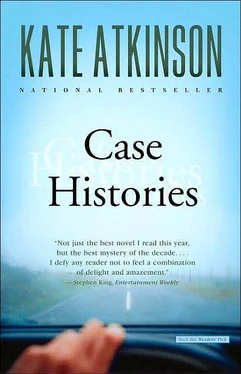
![Дорис Лессинг - Заметки к истории болезни [Notes for a Case History ru/en]](/books/232730/doris-lessing-zametki-k-istorii-bolezni-notes-for-thumb.webp)

